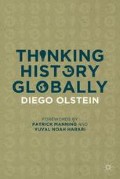Abstract
Historical sociology and civilizational studies are among the very first attempts to think globally about history. Sociology emerged as a field of history trying to make sense of the transformation beyond recognition brought about by the “twin revolutions”: the French Revolution and the Industrial Revolution. The comparative method was at the core of this effort, with Marx comparing modes of production, Émile Durkheim comparing traditional and modern societies, and Max Weber comparing religions, their economies, and societies. This last project, in fact, arranges the world as a set of civilizations derived from the major religions: Confucianism and Taoism in China, Hinduism and Buddhism in India, Judaism and Islam in the Middle East, Catholicism and Protestantism in Europe. This overlap between historical sociology and civilizational analysis exemplifies their cognate nature. Both stem mostly from sociology, rely heavily on the comparative method, and are pathfinders of global thinking.
Access this chapter
Tax calculation will be finalised at checkout
Purchases are for personal use only
Preview
Unable to display preview. Download preview PDF.
Notes
Michael Mann, The Sources of Social Power, vol. I (Cambridge: Cambridge University Press, 1986).
Shmuel Eisenstadt, The Political System of Empire (London and New York: Free Press of Glencoe, 1963).
James Mahoney, Colonialism and Postcolonial Development: Spanish America in Comparative Perspective (Cambridge: Cambridge University Press, 2010).
David Wilkinson, “Central Civilization,” in The World-System: Five Hundred Years or Five Thousand?, ed. A. Frank and B. Gills (London: Routledge, 1993), 31–59.
S. N. Eisenstadt, The Origins and Diversity of Axial Age Civilizations (Albany: SUNY Press, 1986).
Samuel Huntington, The Clash of Civilizations and the Remaking of World Order (New York: Simon & Schuster, 1996).
Samuel Huntington. Who Are We? The Challenges to America’s Identity (New York: Simon & Schuster, 2004).
Immanuel Wallerstein, World-System Analysis: An Introduction (Durham and London: Duke University Press, 2004);
Giovanni Arrighi, The Long Twentieth Century: Money, Power, and the Origins of Our Times (New York: Verso, 1994);
Ana Margarita Cervantes-Rodriguez and Ramon Grosgoguel, eds., The Modern/Colonial/Capitalist World-System in the Twentieth Century: Global Processes, Antisystemic Movements, and the Geopolitics of Knowledge (Westport: Greenwood Press, 2002);
Terence K. Hopkins, Immanuel Wallerstein et al., The Age of Transition: Trajectory of the World-System, 1945–2025 (London: Zed Books, 1996);
Immanuel Wallerstein, “The State and State Transformation: Will and Possibility” Politics and Society 1, no. 3 (May 1971): 359–64;
Immanuel Wallerstein, “The States in the Institutional Vortex of the Capitalist World-Economy,” International Social Science Journal 32, no. 4 (1980): 743–51;
Immanuel Wallerstein, The Concept of National Development, 1917–1989: Elegy and Requiem (Binghamton: Fernand Braudel Center for the Study of Economies, Historical Systems, and Civilizations, State University of New York at Binghamton, 1991);
Immanuel Wallerstein, The Politics of the World-Economy: The States, the Movements and the Civilizations (New York: Cambridge University Press, 1984);
Immanuel Wallerstein, “Response: Declining States, Declining Rights?” International Labor and Working-Class History 47 (Spring 1995): 24–27;
Immanuel Wallerstein, “Socialist States: Mercantilist Strategies and Revolutionary Objectives,” in Ascent and Decline in the World-System, ed. Edward Friedman (Beverly Hills: Sage, 1982), 289–300;
Immanuel Wallerstein, “States? Sovereignty? The Dilemmas of Capitalists in an Age of Transition,” in States and Sovereignty in the Global Economy, ed. David A. Smith, Dorothy J. Solinger and Steven C. Topik (London: Routledge, 1999), 20–33;
Immanuel Wallerstein, “The New World Disorder: If the States Collapse, Can the Nations Be United?,” in Between Sovereignty and Global Governance: The United Nations, the State and Civil Society, ed. A. J. Paolini, A. P. Jarvis, and C. Reus-Smit (London: Macmillan & New York: St. Martin’s Press, 1998), 171–85;
William G. Martin, ed., Semiperipheral States in the World-Economy (New York: Greenwood Press, 1990). 9.
Immanuel Wallerstein, The Modern World-System: Capitalist Agriculture and the Origins of the European World-Economy in the Sixteenth Century (New York: Academic Press, 1974).
Andreas J. W. Goldschmidt and Josef Hilbert, Health Economy in Germany—Economical Field of the Future [Gesundheitswirtschaft in Deutschland—Die Zukunftsbranche] (Germany: Wikom Publishing house, Wegscheid, 2009), 22.
A. Frank and B. Gills, eds., The World-System: Five Hundred Years or Five Thousand? (London: Routledge, 1993).
J. Abu-Lughod, Before European Hegemony: The World-System A.D. 1250–1350 (New York: Oxford University Press, 1989).
Author information
Authors and Affiliations
Copyright information
© 2015 Diego Olstein
About this chapter
Cite this chapter
Olstein, D. (2015). Thinking History Globally: Conceptualizing through Social Sciences. In: Thinking History Globally. Palgrave Macmillan, London. https://doi.org/10.1057/9781137318145_7
Download citation
DOI: https://doi.org/10.1057/9781137318145_7
Publisher Name: Palgrave Macmillan, London
Print ISBN: 978-1-137-47338-7
Online ISBN: 978-1-137-31814-5
eBook Packages: Palgrave History CollectionHistory (R0)

